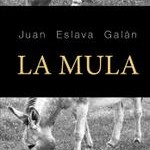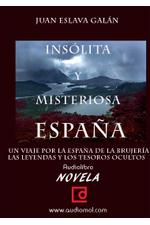Blog del Instituto Cervantes de Dublín
Torre Martello
Audiobook of the week | Audiolibro de la semana: España insólita y misteriosa
This audiobook is a compilation of the mysteries that are part of the Iberian Peninsula since antiquity: a mythical, sacred, mysterious and dreamy place, from the Greek travellers of the Prehistory to the romantics of the 19th century. Juan Eslava Galán is the author of this book. If you wish to download it, get your library card number and click here.
It revises many of these mysteries and answers to certain questions like the kind of ceremonies that took place in the Sacromonte Cave where the “Libros Plúmbeos” were found, the mystical occultism in the kingdom of Felipe II, the alchemists, the templars, the romerías of initiation and the secrets of the Table of Solomon, also including the sacred talisman of Israel that was lost in Spain in the 14th century.
Este audiolibro nos presenta una recopilación de los misterios que desde la Antigüedad envuelven a la península Ibérica: espacio mítico, sagrado, misterioso y evocador, desde los viajeros griegos de la prehistoria hasta los románticos del siglo XIX. Su autor es Juan Eslava Galán. Si quieres descargarlo, coge tu tarjeta de la biblioteca y pulsa aquí.
Revisa muchos de estos misterios y responde a ciertos interrogantes cómo: ¿qué ceremonias se hicieron en la cueva del Sacromonte, donde se encontraron los “Libros Plúmbeos”?, el ocultismo místico del reinado de Felipe II, los alquimistas, los templarios, las romerías iniciáticas y los secretos de la Mesa de Salomón, pasando por el talismán sagrado de Israel extraviado en España en el siglo IX.
Audiolibro de la semana | Audiobook of the week: La mula
 Tras un pequeño paréntesis veraniego retomamos nuestras recomendaciones del fantástico catálogo de audiolibros con el que contamos en la biblioteca. Esta semana os ofrecemos una visión diferente de la Guerra Civil Española a través de una historia cargada de humor y buenos sentimientos. Para disfrutarla, ¡solo tienes que hacer click!
Tras un pequeño paréntesis veraniego retomamos nuestras recomendaciones del fantástico catálogo de audiolibros con el que contamos en la biblioteca. Esta semana os ofrecemos una visión diferente de la Guerra Civil Española a través de una historia cargada de humor y buenos sentimientos. Para disfrutarla, ¡solo tienes que hacer click!
La historia: La mula narra la historia del humilde cabo Juan Castro al que le importa más encontrar a su mula preferida que ganar la guerra. Por eso sale tras ella y, poco después de atravesar la línea de frente, se ve envuelto en un episodio tan peligroso como hilarante que, contra su voluntad, lo va a convertir en un héroe de guerra. La mula es una atrevida desmitificación de la guerra civil. Un personaje pícaro y tierno para desmitificar la guerra.
El autor: Juan Eslava Galán nació en Arjona (Jaén) en 1948; se licenció en Filología Inglesa por la Universidad de Granada y se doctoró en Letras con una tesis sobre historia medieval. Fue profesor de bachillerato durante treinta años, una labor que simultaneó con la escritura de novelas y ensayos de tema histórico. Ha ganado los premios Planeta (1987), Ateneo de Sevilla (1991), Fernando Lara (1998) y Premio dela Crítica Andaluza (1998). Sus obras se han traducido a varios idiomas europeos.
After the summer break we will recommend you once again the very best of our great catalogue of audiobooks. This week we suggest you a different vission of the Spanish Civil World through a story packed with humour and good feelings. You can enjoy it just by clicking here!
The story: La mula tells the story of a humble corporal who is more interested in getting his favourite mule back than winning the war. He goes after it and right after crossing the battlefront, he is involved in a dangerous and hilarious experience that makes him a war hero against his will. La mula is a daring demystification of Civil War with a cheeky and loving main character.
The author: Juan Eslava Galán was born in Arjona (Jaen) in 1948. He got a degree in English Literature at the University of Granada and made his PhD with a thesis about the Middle Ages. He was a Secondary School teacher for over forty years, he combined this job with writing novels and essays focussed on historical times. He won the Planeta Award (1987), Ateneo de Sevilla (1991), Fernando Lara (1998) and the Andalusian Criticism Literary Award. His books have been translated into several languages.




